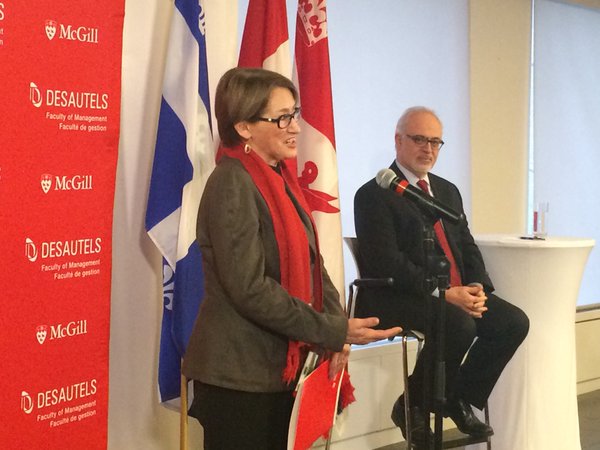Quebec Finance Minister Carlos Leitão, participated in a town hall meeting on the upcoming provincial budget revision at the Desautels Faculty of Management on Monday, Feb. 15, fielding questions from both students and professors on public finance, environmental economic policy, and Quebec’s changing tax structure.
The town hall addressed three topics: Public finance, economy and environment, and financing innovation and education. Students’ Society of McGill University (SSMU) Vice-President (VP) External, Emily Boytinck, brought forward her concerns over austerity and its disproportionate effects on university students, notably students who experience learning challenges.
“Throughout these cuts, the students who are most affected are consistently the ones who are already marginalized by society […] whether it be children with learning disabilities, or students with mental health issues in university,” Boytinck said. “It's across the board the same sort of thing.”
Leitão refrained from referring to budgetary restrictions as austerity, but stated that education will be a financial priority—however, he placed the responsibility of education funding outside his purview, and on the Education and Family Ministers.
“We have a period, yes, of a very tight budget,” Leitão said. “As I said before, we need to make sure that our operating budgets can be financed [….] Going forward, we do have the necessity to make sure [we] spend a little more in education and in health. We believe that […] spending in education will be considerably stronger than it was last year.”
Mark Michaud, senior planning analyst at McGill, questioned how the government will ensure stability within the budget at the provincial level, and how this could affect preparations for McGill's own budget and strategic goals for the future.
"As somebody who works in planning […] a certain amount of predictability is always appreciated,” Michaud said. “I know you mentioned […] there’s always uncertainty, but […] what can the government do to help us in our responsible long-term planning […] and [in] helping us pass that predictability to the families, and the students who have to pay to study here?"
The solution, according to Leitão, lies in first balancing revenues and expenditures in Quebec's operating budget.
"In my opinion, it is so important for us […] to have a balanced budget," Leitão said. "It's not some sort of ideological obsession [….] In order to make sure that we're sending that message, that we now have a predictable and stable framework, it is crucial."
Leitão cited a recent fiscal commission investigating the structure of taxation in Quebec, which indicated that personal and corporate income taxes were the main contribution to budget revenues, and offered recommendations to decrease reliance on these taxes.
“A third or so of the recommendations of the commission were already put into place,” he said. “We already made some significant adjustments […] regarding tax credits and other corporate taxes, but not so much on the personal side.”
McGill Economics Professor Christopher Ragan, echoed Leitão’s concern over Quebec’s current income tax burden.
“You are a well-trained McGill economist, so you know […] the economic damage that can be caused by high rates of taxation,” Ragan said. “In particular, [of] personal income taxation and corporate income taxation [….] You also know that there are both environmental and economic benefits that come from putting a price on pollution.”
Leitão pointed to the efficacy of Quebec’s current system of pricing carbon, and its potential for generating revenue for the future.
“Something we already have in place is a cap-and-trade system,” he said. “It exists and works reasonably well [….It] generates revenue for the government […] which has generated over a billion dollars.”









